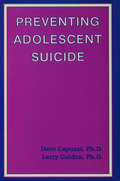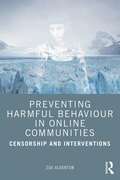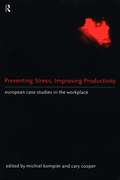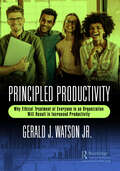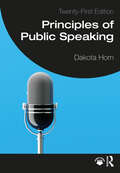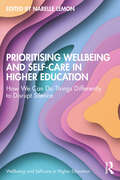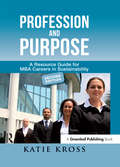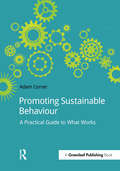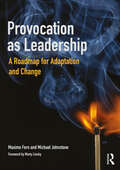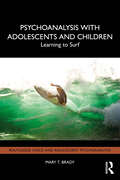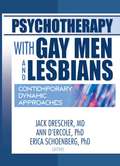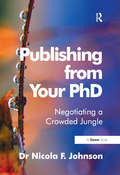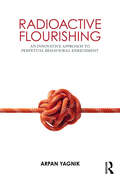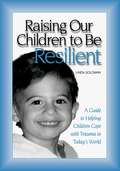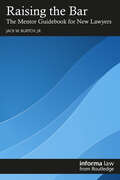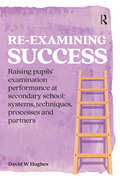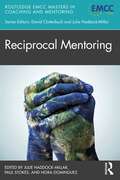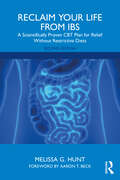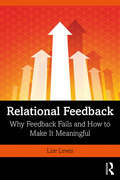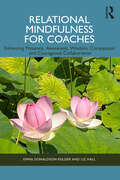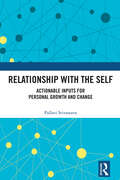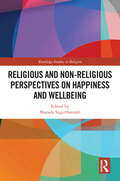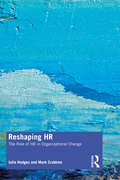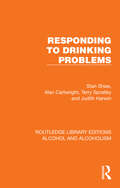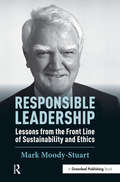- Table View
- List View
Preventing Adolescent Suicide
by Dave Capuzzi Larry GoldenFirst published in 1988. Many people absolutely reject suicide under any circumstances. However. most of us can sympathize with the suicidal motives. let's say. of an elderly person afflicted with terminal cancer. But it disturbs the core of our being that a child would find this life so empty of hope that death would be preferable. Teenagers are so full of pain. pleasure. sexuality. energy. curiosity. idealism. bravado. vulnerability. rebellion. and promise! This book comes to grips with the reality of adolescent suicide. In the book are fifteen chapters organized under five major parts.
Preventing Harmful Behaviour in Online Communities: Censorship and Interventions
by Zoe AldertonPreventing Harmful Behaviour in Online Communities explores the ethics and logistics of censoring problematic communications online that might encourage a person to engage in harmful behaviour. Using an approach based on theories of digital rhetoric and close primary source analysis, Zoe Alderton draws on group dynamics research in relation to the way in which some online communities foster negative and destructive ideas, encouraging community members to engage in practices including self-harm, disordered eating, and suicide. This book offers insight into the dangerous gap between the clinical community and caregivers versus the pro-anorexia and pro-self-harm communities – allowing caregivers or medical professionals to understand hidden online communities young people in their care may be part of. It delves into the often-unanticipated needs of those who band together to resist the healthcare community, suggesting practical ways to address their concerns and encourage healing. Chapters investigate the alarming ease with which ideas of self-harm can infect people through personal contact, community unease, or even fiction and song and the potential of the internet to transmit self-harmful ideas across countries and even periods of time. The book also outlines the real nature of harm-based communities online, examining both their appeal and dangers, while also examining self-censorship and intervention methods for dealing with harmful content online. Rather than pointing to punishment or censorship as best practice, the book offers constructive guidelines that outline a more holistic approach based on the validity of expressing negative mood and the creation of safe peer support networks, making it ideal reading for professionals protecting vulnerable people, as well as students and academics in psychology, mental health, and social care.
Preventing Stress, Improving Productivity: European Case-Studies in the Workplace
by Cary Cooper Michiel KompierIn a representative study made of European workers, twenty-eight per cent of employees reported that stress affects their health and their performance at work. Occupational stress is a serious problem for the performance of individuals, organisations and as a consequence, for national economies. Preventing Stress, Improving Productivity investigates the ways in which companies can combat stress by changing the working environment rather than only treating individual employees with stress symptoms.Costs and benefits of stress prevention are discussed, with an emphasis on appraoches that involve both the work situation and the individual worker. The heart of the book consists of eleven European country chapters, each overviewing the current status with respect to occupational stress and its prevention in that country and then presenting one detailed case study an example of good preventive practice. Preventing Stress, Improving Productivity identifies five factors that are critical for a stress reduction programme to work, both in terms of employee health and well-being and from a financial point of view. Successful strategies combine participation from workers and support from top management. Useful as a reference for psychologists, human resource managers, occupational physicians, ergonomists and consultants, this book will also be an invaluable aid to managers in the day-to-day running of organisations.
Principled Productivity: Why Ethical Treatment of Everyone in an Organization Will Result in Increased Productivity
by Gerald J. Watson Jr.This book demonstrates that ethical treatment of everyone in an organization: 1. Will increase productivity in all the functional activities of the organization as well as its members. 2. Will ensure the growth of the organization as a result of continuous improvements that may have been initiated by management but will be continuously improved by motivated employees. It achieves this by: 1. The presentation of examples from personal experience and a review of the literature. 2. Providing a list of critical questions for each function whose correct solutions will provide a metric that enables and establishes obtainable goals for improvement. This book is unique because it requires the decision-maker to examine each potential decision and ask the questions: 1. Do alternative methods exist that will achieve the desired goals, which will minimize the long-term adverse effects on affected employees and the future viability of the organization? 2. When is the appropriate time to implement this decision? 3. What is the best way to implement this decision? The decision may involve a reduction in force (RIF), a potential change in a vendor or a manufacturing process, the formation of a safety team, and/or the installation or modification of an incentive system. The decisions could be involved in manufacturing, logistics, quality, or healthcare. This work will benefit everyone in leadership positions in all branches of government, manufacturing, logistics, human relations, and healthcare, especially those working with frontline employees, staff, and customers.
Principles of Public Speaking
by Dakota HornNow in its 21st edition, this introductory public speaking textbook encourages the reader to see public speaking as a way to build community in today’s diverse world.Within a framework that emphasizes speaker responsibility, listening, and cultural awareness, this classic book uses examples from college, the workplace, and political and social communication to make the study of public speaking relevant, contemporary, and exciting. Balancing skills and theory, new author Dakota Horn provides expanded coverage of speaking anxiety and understanding and delivering digital presentations along with two new chapters on culture and diversity and diversifying speeches. Each chapter also contains in-class applied activities to support students' learning.This textbook is ideal for general courses on public speaking as well as specialized programs in business, management, political communication, and public affairs.An Instructor’s Manual featuring discussion questions and guides, exercises, quiz questions, and suggestions and resources for syllabus design as well as PowerPoint slides is available at https://www.routledge.com/9781032537634
Prioritising Wellbeing and Self-Care in Higher Education: How We Can Do Things Differently to Disrupt Silence (Wellbeing and Self-care in Higher Education)
by Narelle LemonThis book illuminates international voices of those who feel empowered to do things differently in higher education, providing inspiration to those who are seeking guidance, reassurance, or a beacon of hope.Doing things differently comes with an awareness and curiosity to explore what can be. Increasingly, more and more professionals in higher education are choosing themselves, happiness, families, relationships, kindness, and compassion over arbitrary notions of institutional prestige, continuous pressure to overwork, and competitiveness with others. The chapters in this book do more than highlight flaws in the system, they call for proactive engagement in interrupting and reimagining what is broken. The authors share their own experiences as a way of encouraging readers to take small steps towards self-care, to notice their surroundings, and to embrace change as an empowering tool. The focus is on becoming the change we aspire to see, with a collective readiness to instigate positive transformations.Sharing ambitious ideas to encourage change, this book is a valuable resource for those seeking to enhance their self-care and wellbeing in the higher education context, and for those seeking to engage with others in support of these efforts.
Profession and Purpose: A Resource Guide for MBA Careers in Sustainability
by Katie KrossSustainability holds the promise of an exciting new approach to business – one in which business goals are aligned with social and environmental goals. Multinational corporations are recognizing that we live in an increasingly resource-constrained world, and that more accountability for corporate social and environmental impacts will accrue to them. More importantly, forward-thinking executives understand that sustainability can present new opportunities for competitive advantage – whether that is by reducing costs, minimizing risk, appealing to increasingly conscientious customers, or reaching new markets entirely.With the growth of this field comes a host of interesting new career opportunities for MBAs. As companies are grappling with challenges like how to develop social return on investment (SROI) metrics or understand the potential impact of corporate carbon footprints on stock prices, there are new opportunities for the next generation of managers – managers who are not only trained in traditional MBA fundamentals but also grounded in an understanding of the multifaceted social and environmental challenges facing 21st-century global business leaders. Entirely new career paths are opening to MBAs interested in sustainability: sustainable venture capital, green marketing, corporate social responsibility management, carbon credit trading, and sustainability consulting, to name a few.Perhaps even more than corporate executives, MBA students understand this trend. The next generation of managers can see that the future of business will require a new set of skills and responsibilities. Between 2003 and 2008, membership in Net Impact, the global organization for MBAs and business professionals interested in sustainability, increased more than fourfold. By March 2009, over 130 business schools had a Net Impact chapter. Around the world, MBA students realize that a different model will be required for businesses in the coming decades. The career paths that fall under the broad umbrella of "sustainability" are as diverse as the MBA students themselves. One student may be interested in social entrepreneurship in West Africa, and the next will be seeking advice about clean-tech venture capital careers in Silicon Valley; a third will be interested in greening global supply chains. Corporate social responsibility, sustainable product marketing, microfinance, green real estate development, renewable energy, and other interests all likewise fall under the sustainability umbrella at times. Because of this diversity, it is often hard for business schools' career management centers to address sustainability-related career options in a comprehensive way. Many sustainability-related companies and nonprofits are not accustomed to on-campus recruiting. Others have not historically hired MBAs at all. MBA students and alumni interested in sustainability careers are often left to navigate their own internship and job search paths. And, often, they struggle. Profession and Purpose has been written to address this urgent need. Whether you are focused on an off-campus search or participating in the on-campus recruiting process, there are a host of sustainability-specific career resources you should know about. You'll need to be well versed in sustainability news and trends, and network at the right events, conferences, and company presentations. You also need to know about industry- and discipline-specific websites that post sustainability jobs for positions with titles like Corporate Social Responsibility Manager, Socially Responsible Investing Analyst, and Renewable Energy Market Analyst.Through hundreds of conversations with MBA students, professionals, and recruiters, as well as her own personal experience, the author has compiled the key job search resources and tips for MBAs interested in sustainability careers. The book provides ideas for researching companies, making the most of your networking, identifying job and internship openings, and preparing for interviews. No matter what stage of your MBA career search process you're in, this
Promoting Sustainable Behaviour: A practical guide to what works
by Adam CornerPromoting sustainable behaviour is a critical part of society’s response to climate change. This short, practical book shows you how to build a sustainable behaviour campaign that works. There are more and less effective ways for businesses, NGOs and governments to encourage people to act in a more sustainable way, and some common pitfalls to avoid. By summarizing "what really works" and pulling out the most important take-home messages from the evidence base, this book contains all the tools you need to maximize the success of your sustainable behaviour initiative – in households, when commuting, in the workplace and beyond. By looking beyond individual behaviours to people’s sense of identity and values; by incorporating social signals that provide such important cues for our everyday behaviour; by pointing out strategies that attract (and keep) people’s interest; and by understanding how to break bad habits and create good ones, this guide offers the best chance of making a sustainable behaviour campaign work, to create a lasting change in behaviour.
Provocation as Leadership: A Roadmap for Adaptation and Change
by Maxime Fern Michael JohnstoneTo create deep change, you have to disturb people, or at least risk doing so. Shaking people out of their comfort zones not only generates the possibility of change but also elicits new information and brings out hidden resources that people need to navigate unfamiliar waters. Nevertheless, provoking without antagonizing or shutting people down and tolerating their pushback are complex challenges, requiring skill and will. This is the first comprehensive provocation roadmap: why provocation is necessary for effectively leading change, the different forms of provocation, action tools and frameworks, and case studies illustrating how change is achieved through the sustained and careful use of provocation and disturbance, with strategies and tactics for minimizing the risks involved. We illustrate, for example, how two Australian farmers challenged centuries-old farming practice to regenerate their properties and how a large American bank used the death of a revered CEO to reinvigorate the business. We show how a young indigenous school principal tackled entrenched attitudes to turn a failing school around and how a national statistical service acted like a technology start-up to innovate during the Covid-19 pandemic. The case studies address change at the local level, within organizations, as well as on a national scale. We finish with a synthesis of the lessons learned and a set of ideas about building people’s capacity to use provocation to live, learn, and thrive. Provocation as Leadership offers a blueprint for people who, using provocation, want to ignite change and help their organizations, group, or community break through to a better future. This book provides a vehicle to see provocation in its potential for necessary disturbance, to lay bare its anatomy, and give access to its possibilities, including how to enable provocateurs to live another day.
Psychoanalysis with Adolescents and Children: Learning to Surf (Routledge Child and Adolescent Psychoanalysis)
by Mary T. BradyIn Psychoanalysis with Adolescents and Children: Learning to Surf, Mary T. Brady expertly guides the reader through the challenging and vital process of working with young analysands.Brady likens the experience to ‘learning to surf.’ While finding Bion’s metaphor that the analyst must be able to ‘think under fire’ useful, she suggests ‘learning to surf’ is more apt in psychoanalysis with adolescents and children. Drawing on this metaphor throughout the volume, she describes how the adolescent can be potentially upended, injured or even killed by emotional waves too tumultuous to manage. Surfing also evokes the often uneasy but sometimes thrilling balances of adolescence. Using clinical vignettes from her extensive experience in the field, Brady explores how to work with young people experiencing issues such as eating disorders, gender challenges, parental substance abuse and the impact of the COVID-19 pandemic. Drawing on Bionian Field Theory, as well as the work of Donald Winnicott, she explores how analysts can surf with the adolescent or child in navigating the ebb and flow of psychic life and development.This book is essential reading for psychoanalysts and psychotherapists, including psychiatrists, psychologists, therapists and counselors, who treat children and adolescents.
Psychotherapy with Gay Men and Lesbians: Contemporary Dynamic Approaches
by Jack Drescher Ann D'Ercole Erica SchoenbergExamine gay and lesbian psychoanalysis from a variety of perspectives! Psychotherapy with Gay Men and Lesbians: Contemporary Dynamic Approaches presents case histories of psychotherapy sessions with gay and lesbian patients, focusing on today's psychoanalytical approaches. Dedicated to enhancing the emotional, psychological, and psychiatric treatment of gay men, lesbians, and bisexuals, the book features prominent analysts with a wide range of clinical and theoretical approaches. The foremost experts in the therapeutic field address issues affecting gay and lesbian patients from psychoanalytic perspectives that respect the patients' sexual identities. Psychotherapy with Gay Men and Lesbians reflects the significant clinical and theoretical changes therapists face in dealing with issues of gender and sexuality. New ways of thinking coexist with traditional theory as paradigm shifts in psychotherapy and psychoanalysis affect the treatment of gay, lesbian, and bisexual patients. This book provides a forum to address those changes through clinical papers and discussions. Psychotherapy with Gay Men and Lesbians includes discussion of case reports that deal with: gay therapists treating gay patients countertransferential enactments of sex and gender in treatment rethinking the meanings of homosexuality psychotherapeutic treatment of gay male patients with AIDS and much more! Psychotherapy with Gay Men and Lesbians is an essential forum for the exchange of clinical information on gay and lesbian psychotherapy. The book is a valuable resource for psychiatrists, psychologists, social work therapists, psychoanalysts, and anyone interested in today's psychoanalytic approaches to homosexuality.
Publishing from Your PhD: Negotiating a Crowded Jungle
by Nicola F. JohnsonThere is consistent pressure on all academics to publish, publish, publish. But not unless they have been awarded their PhD - considered by most to be the starting step of an academic career. So while the pressure is on to obtain the title, and then obtain a permanent position, and then publish journal articles, there is little support available to researchers in the nascent stage of their careers. Publishing from Your PhD precisely focuses on providing early career researchers with emotional and collegial support that is often not available in academe. It seeks to dispel nepotistic notions of superiority that places Professors and such on a pedestal. It specifically clarifies the difficulty in having written the PhD thesis and then rewriting it to suit the genre of journal articles. It does not deal with the 'how' of academic writing in general. This book endeavours to shed light on the path one must take to navigate the jungles of academia. This is an untrodden path which is unique to every researcher - especially those who employ abstract or critical theories in their research - and each journey through the jungle is different. However, because there is little literature about this embryonic journey, this book illuminates the processes and difficulties of publishing in journals and culling one's finely honed thesis into small chunks - a difficult task to which few admit.
Radioactive Flourishing: An Innovative Approach to Perpetual Behavioral Enrichment
by Arpan YagnikRadioactive Flourishing is for seekers of lasting happiness and peace. Radioactive Flourishing supplies cognitive insights for eventual behavioral stability. The USP of the book is its flipped human response toward instability. This book’s primary goal is to help people learn ways to flourish individually despite being surrounded by instability.This book is intentionally written in the "katha" style, which means that there are numerous relatable stories and a consistent journey from the core to the periphery, then to the tangent, and back. The implicit and explicit repetition of the key manifest enables the core intervening stimulation to encourage its readers to dig deeper and find solid footing in their flourishing being. This book is for seekers of happiness and peace.This book will be useful to students, researchers, young professionals, and faculty members working in the fields of business administration, psychology, start-ups, finance, entrepreneurship, and communication. It will also be an invaluable resource for aspiring leaders and students of life.
Raising Our Children to Be Resilient: A Guide to Helping Children Cope with Trauma in Today's World
by Linda GoldmanIn this timely and much-needed book, Linda Goldman addresses the many frightening events that impact our children by providing the reader with a seamless mixture of theory and practice garnered from her extensive experience in the field. Raising Our Children to Be Resilient includes trauma resolution techniques and case studies, discussions of the respective roles played by parents, teachers and the larger community as well as additional resources for those in a position to help children who have been traumatized. The goal of Raising Our Children to Be Resilient is exactly what its title promises: to help children through their pain and confusion and guide them into a flexible and compassionate adulthood.
Raising the Bar: The Mentor Guidebook for New Lawyers
by Jack W. Burtch, Jr.The effective mentoring of new associates used to be a natural part of the process for law firms, but nowadays economic pressures are inhibiting the practice; personal mentoring is being eliminated by the fiscal restraints of higher starting salaries and client insistence on fewer lawyers, and hands-on experience is hard to come by. Raising the Bar: The Mentor Guidebook for New Lawyers directly addresses this problem by creating one compact guide to relay the information necessary for success as a lawyer.This practical guidebook offers information, examples and anecdotal stories similar to the mentoring experience young lawyers used to enjoy in person. With its useful “takeaway tips” at the end of every chapter, Raising the Bar will help law students and new lawyers face the hidden challenges of practicing law. Beginning with career planning and the transition out of law school, the book’s 13 chapters cover topics ranging from mastering basic skills and dealing with clients to establishing trust and staying sane. It tackles delicate issues like fixing mistakes and surviving office politics. Finally, it closes with a discussion of other paths for those who decide to apply their legal education outside law practice.Written for new lawyers, law students, law firms and law schools, Raising the Bar offers, in a single book, what hours of close contact with experienced colleagues would provide a new lawyer when making the difficult transition from school to office.
Re-examining Success: Raising pupils’ examination performance at secondary school: systems, techniques, processes and partners (Practical Teaching)
by David HughesIt’s time to look at how to maximise examination success for your pupils and your school in a whole new way.While the examination performance of pupils can define a school’s success, schools have been less than systematic in preparing pupils to give their optimal performance. They focus too heavily on outcomes and too lightly on inputs to the learning process which influence performance. Whole school revision strategies, if they exist, are often curriculum knowledge based, and not designed to support and challenge individual pupils effectively.This book provides the research and practical insights required to radically review and remodel exam preparation provision with a view to ensuring more pupils, particularly those that are vulnerable, can perform to their potential. It explores recent knowledge acquisition and retention strategies, looks at reviewing pedagogical approaches across the curriculum, and addresses the need to work with pupils and parents in new ways. Most importantly it takes an ethical and mentally healthy approach to looking at effective exam preparation.Individual teachers or school leaders can use the book to enhance their current provision at a personal level, while headteachers can drive more radical change by implementing the strategies and approaches at a whole school level.
Reciprocal Mentoring (Routledge EMCC Global Masters in Coaching and Mentoring)
by Julie Haddock-MillarReciprocal mentoring represents an approach to mentoring in organisations that is both timely and of critical importance in the context of diversity, inclusion, equity, and the power shift in mentoring practice. This book provides insight into how reciprocal mentoring programmes can strengthen mutual learning and encourage true partnership between participants. This approach to mentoring places participants on a level playing field; people with disparate expertise, backgrounds, and experience levels are placed in relationships in which they act as both mentor and mentee, generating a range of benefits for all involved. This book explores the design, development, and evaluation of reciprocal mentoring programmes in six different contexts: entrepreneurial, healthcare sector, third sector, education sector, membership organisations, and private sector organisations. Three different approaches to reciprocal mentoring programmes are set out: reciprocal by design, reciprocal by default, and reciprocal as an output. Each chapter describes a number of different case studies which adopt a variety of approaches to reciprocal mentoring programmes, their contextual relevance, and overall impact and contribution. This book will be useful for any individuals and teams involved in the development of mentoring programmes. The range of approaches and frameworks presented in this book will benefit mentoring and coaching practitioners, managers, consultants, professionals in a variety of organisational contexts, and researchers.
Reclaim Your Life from IBS: A Scientifically Proven CBT Plan for Relief Without Restrictive Diets
by Melissa G. HuntReclaim Your Life from IBS teaches a number of skills that can directly reduce the impact of gastrointestinal symptoms in a person’s life. The book explores the differential diagnosis of irritable bowel syndrome (IBS) and the current scientific models of what causes IBS. It teaches the reader the cognitive model of stress management using cognitive-behavioral therapy and helps readers learn to identify their negative beliefs and reframe them more accurately. It also guides readers to reduce avoidance and helps them understand how to use dietary modifications and medications wisely, rather than reactively. In this second edition, numerous case examples throughout illustrate the application of these core CBT skills to IBS-related thoughts and experiences, and new material is included on exercise, diet, and medications. This book is a proven self-help book for people with IBS, as well as being useful as a treatment manual for clinicians who work with patients with IBS.
Relational Feedback: Why Feedback Fails and How to Make It Meaningful
by Lise LewisPeople are increasingly disenchanted with performance improvement techniques that fail to deliver. This book offers a new and refreshing way of engaging in authentic feedback that is willingly given and well-received. It demonstrates that focusing on the quality of relationship improves the activity of feedback. The Relational Leadership WAY© that is the core of this book was created from a thematic analysis of a doctoral research study. The framework encourages effective relationships and works through perfecting a ‘way of being’ that is generative and productive in interactions with others; especially in feedback conversations, whether we are the giver or the receiver. The 10 themes integral to the framework are organised into 3 parts that relate to pivotal points in a conversation and that when given focused attention will improve relationships: What needs preparing to establish relationships that stimulate constructive conversations Active engagement in co-creating generative conversations through adopting relational behaviours You both noticing and reacting to what emerges and impacts on sustaining the quality of the relationship. This book will appeal to those seeking an innovative approach to performance management and who welcome a reprieve from the relentless pursuit of a universal feedback tool. It is essential reading for: Business managers and leaders expected to motivate teams to become high performing work units Organisational and independent coaches, mentors and practice supervisors developing trust by building effective relationships that encourage disclosure through engaging and authentic feedback Managers, leaders, HR and OD specialists to use as a business text for performance management programmes Training organisations to use as a core text for delegates.
Relational Mindfulness for Coaches: Enhancing Presence, Awareness, Wisdom, Compassion and Courageous Collaboration
by Liz Hall Emma Donaldson-FeilderThe quality of coaches’ presence and awareness is key to the quality and success of their coaching relationships and interventions. Relational Mindfulness for Coaches supports coaches to co-create compassionate, psychologically safe yet courageous coaching spaces, generating profound insight, wisdom, and understanding in the client.At the book’s heart are powerful practices to expand mindful presence from the individual to the relational, bringing present-moment, non-judgemental awareness to self, others, and the relationship, whilst speaking and listening. The book provides understanding of Relational Mindfulness’s (RM’s) foundations in mindfulness, compassion, and Insight Dialogue. Drawing on their and other experienced coaches’ experiences, the authors illustrate the benefits of engaging in RM practices and provide easy-to-follow guidance for bringing RM into coaching. They also situate RM in the wider field of theory and practice, including neuroscience, and explore RM in relation to a host of other coaching models. In these challenging times of polarisation and conflict, the climate emergency, and a crisis in mental health, this inspiring book addresses the urgent need to create transformational dialogue and interrelatedness in coaching and beyond.This pioneering book will be essential reading for coaches, coaching supervisors, coaching psychologists, coaching academics, leaders, and other helping professionals.
Relationship with the Self: Actionable Inputs for Personal Growth and Change
by Pallavi SrivastavaThis book delves into the various aspects of a person’s relationship with their inner selves and the impact this crucial relationship can have on their well-being. It offers insights, tools, and practices to understand and nurture this relationship focusing not only on the ‘what’ but also on the ‘how’ of it. Designed to be a self-help guide, this book takes readers on an exciting journey into their inner worlds and dives into the various voices within a person. Drawing from the fields of psychology, coaching, and mindfulness, the book breaks down complex ideas like acceptance, authenticity, and selfcompassion into actionable steps.The book will be indispensable for readers interested in improving well-being and enhancing personal development skills. It will also be useful for students and researchers of positive psychology and behavioral psychology and mental health and wellness rofessionals including therapists, counsellors, and executive coaches.
Religious and Non-Religious Perspectives on Happiness and Wellbeing (Routledge Studies in Religion)
by Sharada SugirtharajahThis book explores the theme of happiness and well-being from religious, spiritual, philosophical, psychological, humanistic, and health perspectives. Taking a non-binary approach, it considers how happiness in particular has been understood and appropriated in religious and non-religious strands of thought. The chapters offer incisive insight from a variety of perspectives, including humanism, atheism and major religions such as Christianity, Islam, Buddhism, Hinduism, and Judaism. Together they demonstrate that although worldviews might vary substantially, there are concurrences across religious and non-religious perspectives on happiness that provide a common ground for further cross-cultural and interreligious exploration. What the book makes clear is that happiness is not a static or monolithic category. It is an ongoing process of being and becoming, striving and seeking, living ethically and meaningfully, as well as arriving at a tranquil state of being. This multifaceted volume makes a fresh contribution to the contemporary study of happiness and is valuable reading for scholars and students from religious studies and theology, including those interested in interreligious dialogue and the psychology of religion, as well as positive psychology.
Reshaping HR: The Role of HR in Organizational Change
by Julie Hodges Mark CrabtreeThe aim of this book is to explore the contribution HR can make to how organizations enact change within the context of an environment of increasing complexity driven by global forces for change. In particular the book focuses on the role of HR in creating value for organizations and engaging stakeholders during transformations. This aim is achieved in several distinct ways. First, a critical perspective is provided of the role of HR in organizational change by examining evidence-based theories, models and frameworks. Second, the book is grounded in empirical evidence from a study conducted by the authors amongst managers and HR professionals across the globe. This provides unique data on the challenges and opportunities which the practice of HR faces within the context of organizational change. Third, consideration is given as to how HR can play an active and constructive role in co-creating sustainable change with managers, employees and other stakeholders. Fourth, the book identifies the capabilities required by HR professionals in order to engage effectively with organizational change. Finally, aware of the dangers of prescriptive lists, the HR practices offered in this book are provided as a basis for amendment, as necessary, by readers depending upon the context of individual organizations. The book will be of value to practising HR professionals as well as students studying HRM and change and development in organizations. Our proposal in this book is that since people are of significant importance to the success of change, and HR knowledge and expertise is vital to the experience and engagement of individuals and teams, internal and external to the organization, there needs to be clarity about the role of HR in transformations. We suggest that HR’s raison d’être is to focus on the people aspect of organizational change and that this needs to be done within the context of improving organizational effectiveness and wellbeing.
Responding to Drinking Problems (Routledge Library Editions: Alcohol and Alcoholism)
by Judith Harwin Stan Shaw Alan Cartwright Terry SpratleyIn the 1970s family doctors, social workers, researchers and administrators had been aware of the inadequacy of the response to drinking problems for some time. However, there had been no systematic examination of why such agents felt negatively about drinkers and disinclined to respond to them. Originally published in 1978, this book develops a radical new perspective on the prevalence and causes of drinking problems, combining reviews of historical and contemporary literature with the authors’ own research studies. This perspective is then linked to the need for an integrated response from both medical and social services, with a particular accent on the need for a community response. By focusing on the relationship between helper and helped a solution is sought to the question which has troubled the field for many years: why are agents like family doctors and social workers so inadequate in recognising and responding to people with drinking problems? The crucial aspects within the therapeutic relationship are pinpointed and experimental studies are described which show how training, casework, supervision and the redeployment of expertise can help improve recognition rates and responses to individual drinkers. This book thus expresses the need for major changes both in our attitudes and understanding of people with drinking problems and the difficulties of agents who try to help them. It should still be of historical interest to social scientists and those involved in helping people with drinking problems.
Responsible Leadership: Lessons from the Front Line of Sustainability and Ethics
by Mark Moody-StuartAs Chairman of the Royal Dutch/Shell Group from 1991–2001 and Anglo American plc from 2002–2009, Sir Mark Moody-Stuart is as qualified as anyone on the planet to discuss the realities, dilemmas and lessons to be learnt from the last 20 years of corporate engagement with sustainability, ethics and responsibility. In this unique book – part memoir, part confessional, part manifesto for leadership – we hear a unique voice from the front line of corporate responsibility. Moody-Stuart retraces the steps of a remarkable journey from being a postgraduate geologist to being at the helm of two of the largest corporations in the world.We hear of dealings with dictators and prime ministers, colleagues and NGOs, rivals and friends. We travel from Syria to Nigeria; Iraq to Downing Street; and from the machinations of the United Nations to those inside the boardroom of Shell. We see Shell’s annus horribilis in 1995 unfold through the eyes of an insider, and how Brent Spar and the execution of Ken Saro-Wiwa sent shockwaves through the company, resulting in a complete reappraisal of its mission and principles. We hear about the oil and mining sectors and their complicated development role in areas of conflict and corruption; the way that markets have failed us on climate change and corruption; and how governments need to step up to the global challenges we face. We hear how Deepwater Horizon could have been avoided; what Shell were asked to do by Tony Blair during the UK fuel blockades of 2000 and why they declined; why China is too important to ignore; and why the Global Compact is too important to fail. We hear lessons from a life spent living in 10 different countries and we come to realize that, for corporations, trying to do the right thing can sometimes be almost impossible. We also come to know a deeply ethical and thoughtful leader who has always tried to do exactly that.
